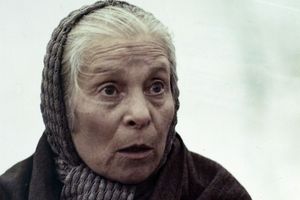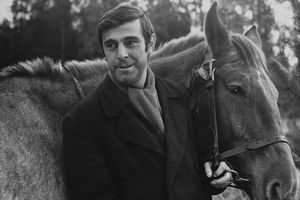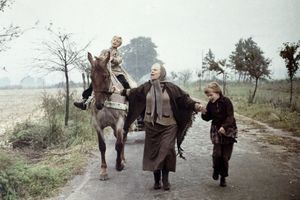Der Wüstenkönig von Brandenburg
Regie: Hans Kratzert, 81 Min., Farbe, Spielfilm
Deutsche Demokratische Republik (DDR)
DEFA-Studio für Spielfilme, 1973
- Film-/Videoformat
- 35 mm
- Länge in m
- 2246
- Englischer Titel
- The Desert King Of Brandenburg
- Premierendatum
- Anlaufdatum
- Literarische Vorlage
- Schubert, Dieter: "Der Wüstenkönig von Brandenburg", Erzählung
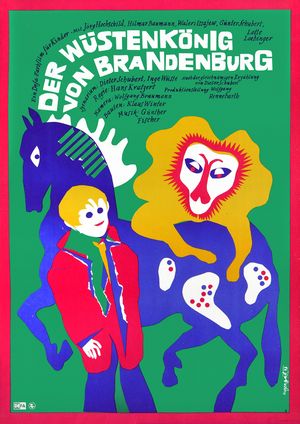
(R: Hans Kratzert, 1973) Grafiker: Nagenast
Kurzinhalt (Deutsch)
In den ersten Nachkriegstagen streift der elfjährige elternlose Julius, der aus dem zerbombten Berlin geflohen ist, durch den Wald. Gleichzeitig mit dem aus der Haft befreiten Kommunisten Kaiser findet er ein Pferd. Im nächsten Ort melden sie sich beim sowjetischen Kommandanten. Der macht Kaiser zum Direktor eines am Ortsrand lagernden Wanderzirkus, dessen große Attraktion ein Löwe ist. Der hat, wie die Menschen, Hunger. Kaiser will das Pferd opfern, doch Julius flieht mit ihm. Er erlebt einige Abenteuer, lernt das Mädchen Ulrike kennen, verteidigt mit ihr das Pferd gegen einen Schieber. Inzwischen ist der Löwe ausgebrochen, und auf dem Marktplatz bedroht er Ulrike. Um sie zu retten, schiebt Julius dem Löwen das Pferd hin. Doch der frisst keine Pferde, weil er sie vom Zirkus kennt. So werden die beiden, Löwe und Pferd, eine Zirkusnummer, während Julius und Kaiser zusammen nach Berlin gehen.
(Quelle: Das zweite Leben der Filmstadt Babelsberg. DEFA-Spielfilme 1946-1992)
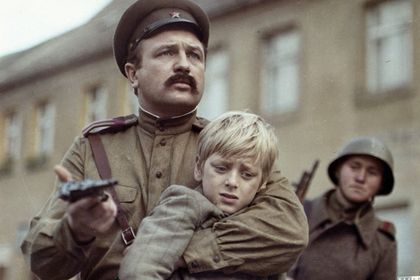
(R: Hans Kratzert, 1973) Fotografen: Dieter Lück, Günter Sahr
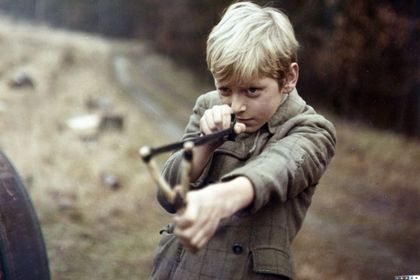
(R: Hans Kratzert, 1973) Fotografen: Dieter Lück, Günter Sahr
Filmstab
- Regie
-
- Hans Kratzert
- Drehbuch
-
- Hans Kratzert
- Szenarium
-
- Dieter Schubert
- Inge Wüste
- Kamera
-
- Wolfgang Braumann
- Schnitt
-
- Rita Hiller
- Darsteller
-
- Jörg Hochschild (Julius)
- Hilmar Baumann (Kaiser)
- Waleri Issajew (Boris)
- Günter Schubert (Stahlfeder)
- Günter Junghans (Bürgermeister)
- Lotte Loebinger (Großmutter)
- Andrea Gutsche (Ulrike)
- Sabine Lorenz (Hamila)
- Heinz Scholz (Alois)
- Anatoli Scholjokow (Bärtiger Starschisergeant)
- Pjotr Wnukow (Offizier)
- Wladimir Tankow (Sowjetischer Regulierer)
- Peter Heiland (Polizeichef Bruno)
- Arnim Mühlstädt (Dicker Bauer)
- Horst Kube (Bauer auf Feld)
- Manfred Otto (Fahrer bei Mack)
- Frank Michelis (Alter Arbeiter)
- Victor Keune (Mack)
- Wladimir Gorschkow (Sascha)
- Gerd Funk (Förster)
- Illelore Kuhnert (Sekretärin vom Bürgermeister)
- Klaus Gehrke (Waldarbeiter)
- Joseph Schorn (Alter Waldarbeiter)
- Werner Dissel (Alter Herr)
- Axel Daehn (Artist)
- Günter Drescher (Artist)
- Hannes Schönemann (Artist)
- Bernd Czarnowski (Artist)
- Gabor Dorsch (Junger Mann)
- Manuela Marx (Junges Mädchen)
- Regieassistenz
-
- Hannes Schönemann
- Szenenbild
-
- Klaus Winter
- Dramaturgie
-
- Dieter Wolf
- Musik
-
- Günther Fischer
- Ton
-
- Peter Foerster
- Gerhard Ribbeck
- Musikinterpret
-
- Günther-Fischer-Sextett (Musikgruppe)
- Kostüm
-
- Barbara Braumann (geb. Müller)
- Maske
-
- Otto Banse
- Produktionsleitung
-
- Wolfgang Rennebarth
- Aufnahmeleitung
-
- Viet-Peter Treuholz
- Peter Schlaak
- DEFA-Fotograf
-
- Dieter Lück
- Günter Sahr
Kurzinhalt (Englisch)
A few days after the end of World War II, the eleven-year-old orphan Julius is on the run from the destroyed city of Berlin. In a forest he meets the formerly imprisoned communist Kaiser. By chance, they both detect a horse at the same time. When they report the incidence in the next town, a Soviet commander obligates them to work at a traveling circus, which has set up camp on the outskirts. Kaiser even gets appointed ringmaster. Since it is very expensive to feed the circus’ main attraction, a lion, Kaiser thinks of using the horse as food. Julius, however, is horrified by this idea and takes flight together with the horse. After several adventures and after having made the acquaintance of a girl called Ulrike, who helps him to save the horse from a racketeer, Julius is again confronted with the lion: It has escaped and threatens Ulrike’s life. Now Julius is willing to sacrifice the horse. The lion, however, does not touch the horse since it knows the horses from the circus. Eventually, both the lion and the horse perform at the circus while Julius and Kaiser return to Berlin.
(Quelle: filmportal)
Kurzinhalt (Weitere Sprachen)
Nei primi giorni del dopoguerra il piccolo Julius, rimasto orfano, lascia Berlino e si mette a vagare per il bosco. Con Kaiser, un ex detenuto comunista, trovano un cavallo. In un villaggio, un comandante comunista nomina Kaiser direttore di un circo, la cui principale attrazione è un leone, affamato come tutti gli altri. Kaiser vorrebbe sacrificare il cavallo, ma Julius scappa con l'animale. Durante la sua avventura conosce Ulrike, che lo aiuterà a difendere il cavallo da un truffatore. Fuggito dal circo, il leone minaccia Ulrike sulla piazza del mercato. Per salvarla, Julius spinge il cavallo fra lei e il leone. Ma il felino non mangia cavalli, che conosce bene dal circo. D'ora in poi leone e cavallo si esibiranno insieme, mentre Julius e Kaiser rientrano a Berlino. (Italienisch)

